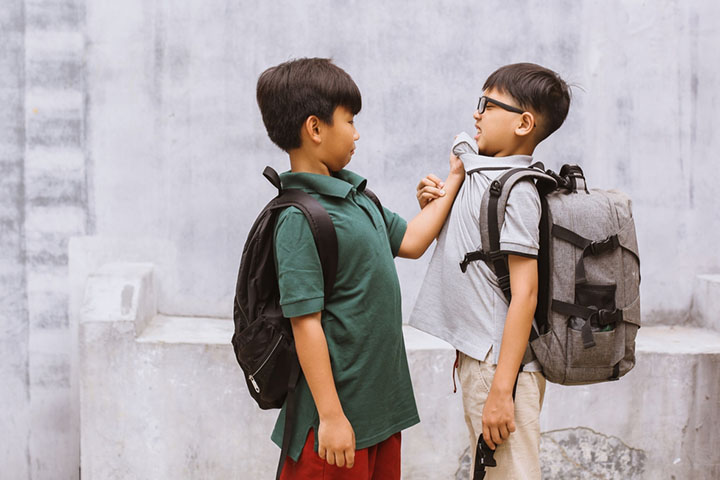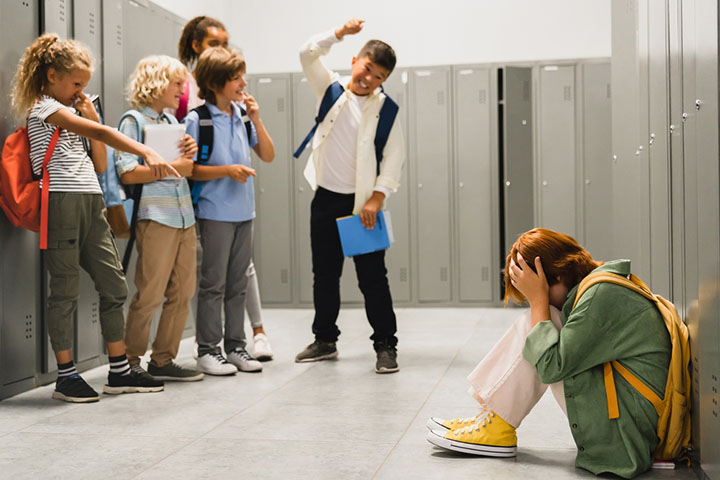
Image: Shutterstock
Greetings, moms and dads! Every parent wants their r little ones to have a happy time at school. In this article, let’s chat about how we can make sure their school days are like a smooth ride without any bumps. We’ll explore ways to figure out if there are any issues with their classmates and, more importantly, how to fix them. Because, let’s face it, a positive and joyful school experience is what we’re aiming for. So, buckle up, and let’s make sure your child’s school days are all about good vibes and happy memories!
How To Know If Your Child Has Problems With Their Classmates?
Image: Shutterstock
1. Watch For Behavior Changes
If your once bubbly and outgoing child becomes withdrawn or moody, it could be a sign of trouble. Sudden changes in behavior might indicate they’re facing issues with their classmates.
2. Listen To Their Stories
Kids love sharing stories about their day. If your child’s tales suddenly shift from laughter to frustration, pay attention. They might be dropping hints about difficulties with their classmates.
3. Keep An Eye On Their Social Circle
A sudden shift in friendships could be a red flag. If your child starts avoiding certain kids or seems isolated, it’s time to dig a bit deeper.
4. Look For Physical Signs
Unexplained bruises, scratches, or torn clothing might be indicators of problems with classmates. Kids can sometimes express their troubles physically.
5. Changes In Academic Performance
Image: Shutterstock
Noticeable drops in your child’s grades or a sudden disinterest in schoolwork might signal underlying issues with classmates affecting their focus and motivation.
6. Complaints About Bullying
Pay attention if your child mentions feeling targeted or bullied. Verbal or physical bullying can significantly impact their well-being and relationships with classmates.
7. Unwillingness To Attend School
If your child consistently expresses reluctance or refusal to go to school, it could be a sign of discomfort or distress related to their interactions with classmates. This reluctance is a crucial signal to investigate further.
8. Disrupted Sleep Patterns
Anxiety about social situations at school may disrupt your child’s sleep. If you notice changes in their sleep patterns, such as trouble falling asleep or frequent nightmares, it could be linked to classmate issues.
Practical Ways Of Preventing Classmate Issues
Image: Shutterstock
1. Encourage Open Communication
Create a safe space for your child to share their feelings. Let them know it’s okay to talk about their day, both the good and the not-so-good parts.
2. Teach Empathy
Help your child understand the importance of putting themselves in others’ shoes. Encouraging empathy can go a long way in preventing conflicts.
3. Foster Healthy Social Skills
Teach your child the basics of good communication, sharing, and being a good friend. Social skills are the building blocks of positive relationships.
4. Be A Role Model
Image: Shutterstock
Children learn by example. Demonstrate kindness, respect, and understanding in your own interactions. Your behavior can shape their approach to relationships.
5. Set Clear Expectations
Discuss and establish clear expectations for respectful behavior with your child. Make sure they understand the importance of treating others kindly and resolving conflicts peacefully. Having a foundation of clear expectations can help prevent issues from arising.
Steps To Consider When They Are Already Having Problems With Classmates
Image: Shutterstock
1. Listen First
When your child opens up about a problem, listen without judgment. Let them express their feelings, and avoid jumping to conclusions.
2. Communicate With The Teacher
Reach out to your child’s teacher to gain insights into their interactions at school. Teachers can provide valuable information and work with you to address any issues.
3. Encourage Problem-Solving Skills
Guide your child in finding solutions. Help them brainstorm ideas on how to handle conflicts constructively, teaching them valuable problem-solving skills.
4. Involve The School
Image: Shutterstock
If the issue persists, don’t hesitate to involve the school. Reach out to the school counselor or principal to discuss the problem and work together on finding a resolution.
5. Teach Conflict Resolution
Empower your child with the tools to resolve conflicts peacefully. Encourage them to express their feelings calmly and find common ground with their classmates.
6. Promote Inclusivity
Encourage your child to be inclusive and welcoming to all classmates. Being a positive force in their class can help prevent problems and create a supportive environment.
7. Monitor Online Interaction
In today’s digital age, online interactions can also contribute to classmate issues. Keep an eye on your child’s online presence and address any cyberbullying or online conflicts promptly.
Dealing with f your child’s school relationships doesn’t have to be a puzzle. By following the cues mentioned in the article, you can create an environment where your child thrives. Remember, open communication is key, and by being proactive, you’re setting the stage for your child to have a positive and enjoyable experience with their classmates. Keep the lines of communication open, and together, let’s make sure their school days are filled with friendship and laughter.


















